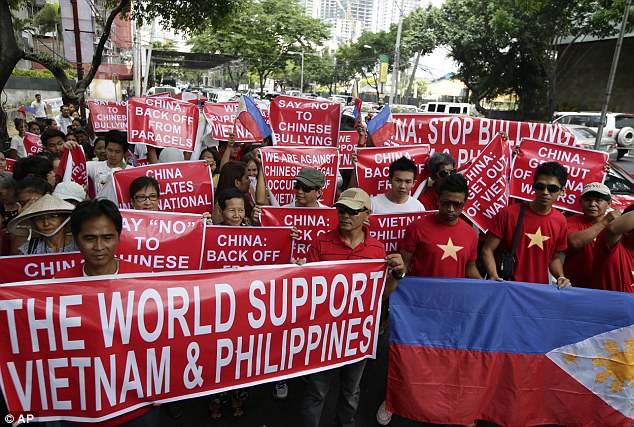(Photo Credit: AP)
(BGF) – This recent article, published in The Economist, discusses the relative impunity China is able to act with in its territorial disputes in the South China Sea. As the article notes, China’s actions, such as placing an oil rig off the coast of Vietnam or its potential plans to build on the Johnson South Reef in violation of its agreement with ASEAN, have elicited objections from Vietnam and the Philippines, but such objections have had only a minimal substantive impact, at best. Click here to read the full article or visit The Economist‘s website.
Force Majeure
The Economist
FOR a man leading a country castigated in the official Chinese press as America’s “paranoid junior ally”, President Benigno “Noynoy” Aquino of the Philippines seems both remarkably relaxed and surprisingly conciliatory. Territorial disputes in the South China Sea, which prompted China Daily’s scolding, are not, Mr Aquino says, the “be-all and end-all” of his country’s relations with China. He has to manage the “tension between being as forthright as possible and weighing whether or not I am tweaking their nose”. As he spoke to Banyan this week in the presidential palace in Manila, the non-nose-tweaking side of Mr Aquino’s internal debate seemed to be winning: bilateral trade and tourism are booming, both sides are trying to “isolate” the complex row from the broader relationship, and Mr Aquino has tried not to respond to “provocative statements”.
Yet recent weeks have seen China engage in behaviour in the South China Sea that shows total disregard for the noses of its neighbours. In the northern part of the sea, near the Paracel islands, which it disputes with Vietnam, China has moved a massive oil rig, defended by a large flotilla, into waters Vietnam regards as within the Exclusive Economic Zone (EEZ) it is entitled to under the international law of the sea. Anger at this in Vietnam sparked rioting in which hundreds of factories were looted and torched and six Chinese died. China has since evacuated thousands of its expatriate workers and demanded compensation. Few of the ravaged factories were in fact Chinese-owned. Most were investments from Taiwan. So the destruction has both lost Vietnam any moral advantage and suggested more may be going on than simple patriotism turned on a historical enemy.
Farther to the south, photographs have shown China engaged in filling in the sea at the Johnson South Reef, in the Spratly chain of islands. Some analysts suggest that China intends to build an airstrip there. The Philippines has protested. It regards the reef as within its EEZ. And a declaration signed in 2002 by the ten-member Association of Southeast Asian Nations (ASEAN) and China bars new building on disputed rocks.
Perhaps most outrageous, China does not even deign to explain the basis of its claims. In the case of the oil rig, for example, it might regard the area where it is operating as part of the EEZ attached to Hainan province, an undisputed part of its territory. Or perhaps it belongs to the Paracels, from which China expelled the former South Vietnam in 1974. Or perhaps it is just encompassed by the “nine-dash line”, a lolling tongue of passive cartographic aggression that China says gives it historical rights over almost the entire South China Sea. The nine-dash line is itself ambiguous. Chinese scholars say that it probably implies a claim to the land features inside the line, an interpretation which could in theory be squared with the law of the sea. But even they are not sure that it does not assert sovereignty over the water as well.
In the face of all this Mr Aquino tempers his outrage with realism. “They are 1.3 billion people and we are 98m”, he says. This echoes the words of the then Chinese foreign minister in 2010, who reminded ASEAN that “China is a big country and other countries are small countries and that is just a fact.” A sober assessment suggests that none of the three approaches the Philippines has adopted to resist Chinese encroachment stands much hope of success—though they have certainly annoyed China.
Click here to continue reading.
